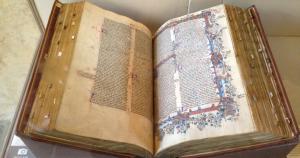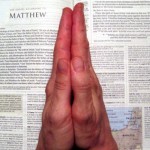 Romans 15:1-16
Romans 15:1-16
I love books. At my last count (taken several years ago), I have over 3000 books now – and counting. Every time we move (which has been way too often in the past), Jackie and I are struck by how many boxes of books there are to move. Usually, I have to lift and move them all by myself. After this last doozy of a move, some of them are still orphans or foundlings. I have books on theology, art, literature, education, and from most of the letters in the Library of Congress system.
There are books that attempt to tell us how to help ourselves and how to achieve peace and hope in this troubled world. There’s even one book that I have probably 100 copies of, in all sizes and shapes and translations and in about 10 languages, including Braille. It’s the all-time bestseller which sells so consistently well that the New York Times bestseller list would never have any other #1 if they put it on the list. It is the “Book of books.” It is “the Bible,” which simply means, “The Book.”[1]
The Bible is many things, but this morning St. Paul, with some help from the Collect for the Day, reminds us that the Bible is the book of hope because it leads us to Jesus Christ, who is our hope.
In the first place, we begin with hope because the God who created the heavens and the earth, chocolate and coffee and orchids, has revealed Himself to us. Not only has He left reminders of Himself in every corner of the creation, but He’s also spoken to His people. More specifically, St. Paul says that, “whatever things were written before were written for our learning” (verse 4). When Moses wrote Genesis or Exodus, he was inspired to write them for our learning and life, and when St. Paul wrote to the church in Rome, he wrote for our learning and life.
Why? There are many reasons but the reason Paul gives is so that through the patience and comfort of the Scriptures we me might have hope. Isn’t that, ultimately, the message of Romans? Sometimes we get so hung up on proving theological points that we forget the import of these theologies: hope. Romans and its message of the sinfulness and condemnation of man would have been a pretty bleak book, were it not ultimately about hope. The hope that Paul holds out to us today is that there is no condemnation for those who are in Christ Jesus through faith.
If you read Romans and do not end in hope, then you have either misread Romans or you are stubborn in your sinfulness.
The entire Bible is a book of hope. It has comforted countless saints. Although I don’t recommend this technique, so dense and laden with hope is God’s Word that you could randomly point to a verse in the Bible and find hope there, because God and His offer of salvation are there.
Look: I’ll prove it. I’ll randomly point to 3 verses of the Bible. I promise I won’t fudge the results, although I might have to look at the surrounding verses to find the hope.
Here goes.
- Judges 10:3. “After him arose Jair, a Gileadite; and he judged Israel twenty-two years.” Not very promising, is it? But what do we read in verse 1? “After Abimelech there arose to save Israel Tola the son of Puah.” God raised up the judges, including Jair, to save Israel. There’s your hope.
- Isaiah 49:10. “They shall neither hunger nor thirst, neither heat nor sun shall strike them; for He who has mercy on them will lead them, even by the springs of water He will guide them.” That one’s pretty easy to see. O.K. One more, from the New Testament.
- 2 Timothy 1:12. “For this reason I also suffer these things; nevertheless I am not ashamed, for I know whom I have believed and am persuaded that He is able to keep what I have committed to Him until that Day.” That one’s easy to see, too.
The Word of God is the word of hope. Every time Jackie has gone into labor she has requested that I read to her a list of Bible verses she has gathered together. In the midst of that pain, the Word of God gives her hope and strength like nothing else!
Why do we hope? Because God has made incredibly wonderful promises to us – and we know He will keep them! Every promise God made to Abraham and Israel, He kept, in spite of their unfaithfulness. He even superabundantly fulfilled them in still more wonderful ways through His Son.
This hope has now come even to us Gentiles: “There shall be a root of Jesse; and He who shall rise to reign over the Gentiles, in Him the Gentiles shall hope” (verse 12). In Jesus, our hope is fulfilled as well, and the Bible is a book about Jesus: God with us, God saves.
The Word of God brings peace and hope above all because it brings us to Jesus Christ. It is only because the Word of God brings us to Christ that we have hope and we are saved. No one was ever saved by the Bible, no matter how much they believe it. We Evangelicals should remember that. Only Jesus saves us, and He is the one who will fill us with joy, peace, and hope.
Notice that what Paul ascribes to the Bible in verse 4 he ascribes to God in verses 5 and
- In verse 4, Paul talks about how through patience and comfort the Scriptures produce hope. But in verse 5, it is God who is the God of patience and comfort: the Bible can’t give these things by itself. In verse 13, God is the God of hope who will fill us with joy and peace in believing, that we may abound in hope by the power of the Holy Spirit.
What is the Bible, anyway? If you lived in the second century, what was the Bible? It was a collection of scrolls that you heard read in your local church. You would never have held one, much less owned one. It was and is the Word of God as received by the faithful in the Body of Christ, the community of the faithful.
It is not the Scriptures themselves that give hope and comfort, but the Scriptures as inspired by the Spirit and brought by the Spirit to a faithful hearer that give hope and comfort – and salvation. As with angels, don’t worship the messenger!
I hold to an incarnational, not a Koranic, view of the Bible. The Bible is both divine and human. The Bible by itself is no good. You must also have the Holy Spirit, a faithful hearer, and faithful interpreters. “If a Bible drops in the forest and no one reads it, does it save anyone?” The Bible was written and continues to be read in the context of the Body of Christ. When we read it apart from that Body, we quickly descend into heresy.
There is nothing automatic about reading the Bible and finding hope. I know a lot of students who have gone off to college and attended courses in the Bible. But they received no comfort or hope or joy in those classes because the Bible read with an attitude of doubt and it was treated like an ancient books of myths to be disproved.
But a miracle happens when we read the Bible with faith! Because God, being God, can place Himself in the pages of my Bible, I read it, have faith, and find hope! It becomes a means of grace; the heavens open, and I see Jesus Christ and God through Him!
The Word of God was written for my benefit – and yours!
Therefore, take care how you read it. First of all, you must read it or hear it. If you’re reading this, then certainly you are. But when the manna of my Daily Bread stops falling, don’t stop reading the Bible. If you choose not to read Daily Bread on a given day, that’s no skin off my nose: but make sure you are reading the Bible and seeking God in it.
How should I read it? Consider the Collect for the Second in Advent: “Blessed Lord, who hast caused all holy Scriptures to be written for our learning; Grant that we may in such wise hear them, read, mark, learn, and inwardly digest them, that by patience, and comfort of thy holy Word, we may embrace, and ever hold fast the blessed hope of everlasting life, which thou hast given us in our Saviour Jesus Christ.”
Hear and learn the Bible in the Church; read and mark it on your own and in groups; and inwardly digest it yourself, since no one else can do this for you!
Prayer: Blessed Lord, who hast caused all holy Scriptures to be written for our learning; Grant that we may in such wise hear them, read, mark, learn, and inwardly digest them, that by patience, and comfort of thy holy Word, we may embrace, and ever hold fast the blessed hope of everlasting life, which thou hast given us in our Saviour Jesus Christ.
Points for Meditation:
- Has my reading of the Bible lately been fruitful? What method am I using? What other ways of reading it may make it more alive and profitable to me?
- The next time you read the Bible, pray that you will receive it as the Word of God, and then treat it as the Word of God.
- What are some of your favorite verses that foster hope in you?
Resolution: I resolve to read the Bible this week as the very Word of God and to take whatever time is necessary to properly digest it.
[1] It might be better to call the Bible simply the Word of God because for most of its history people have not experienced it as a book but as a spoken and lived word.
Wycliffe Bible – photo taken by Fr. Erlandson












